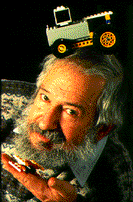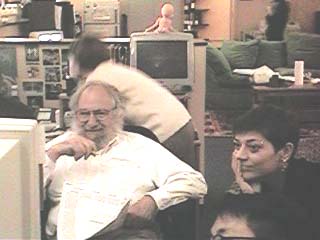| People laughed at Seymour
Papert in the sixties when he talked about children using computers as
instruments for learning and for enhancing creativity. The idea of an
inexpensive personal computer was then science fiction. But Papert was
conducting serious research in his capacity as a professor at MIT. This
research led to many firsts. It was in his laboratory that children first
had the chance to use the computer to write and to make graphics. The Logo programming language was
created there, as were the first children's toys with built-in
computation. |
| Today Papert is considered
the world's foremost expert on how technology can provide new ways to
learn. He has carried out educational projects on every continent, some of
them in remote villages in developing countries. He is a participant in
developing the most influential cutting-edge opportunities for children to
participate in the digital world. He serves on the advisory boards for MaMaMedia Inc. (whose founder, Idit
Harel, was once a doctoral student of his at MIT) and of the LEGO Mindstorms product line
(which was named after Papert's seminal book Mindstorms: Children,
Computers and Powerful Ideas). |
| Papert lives in Maine, where
he has founded a small laboratory called the Learning Barn to develop
methods of learning that are too far ahead of the times for large-scale
implementation. He has been named distinguished professor by the
University of Maine and is credited with inspiring the first initiative
aimed at giving a personal computer to every student of a state. He spends
a large part of his time working in the Maine Youth Center in Portland,
the state's facility for teenagers convicted of serious
offenses. |
| Papert's contributions go
beyond the field of education. He is a mathematician and is a cofounder
with Marvin Minsky of the Artificial
Intelligence Lab at MIT and a founding faculty member of the MIT Media Lab, where he continues to
work. Papert collaborated for many years with Jean Piaget at the
University of Geneva in Switzerland. |


